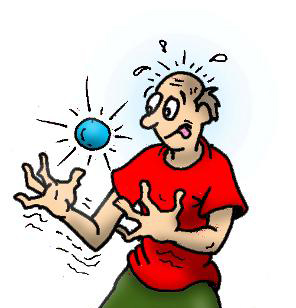
Thanks so much for asking me to facilitate your strategy and skills-share day. I really admire the work that ‘Peace Activists Resisting Plutocracy’ (PARP) has done over the years. So much so that I’ve knocked 10% off my very reasonable fee.*
This is going to be a session about how we find out who in the room has what skills, and how we can find out what skills we don’t have, but would like to have. The tools we’ll use are really simple, there is no need for special equipment. However, if there is anything you like from what we do in the rest of the day – it’s my intellectual property, and I have my lawyer on speed dial. You’re not allowed to TAKE IT or STEAL IT. Don’t waste your breath or my time asking for permission to use it.... [Host of event intervenes, whispers in facilitator’s ear. In fact, clips it, nonviolently].
Oh, um, right, sorry. Let’s crack on shall we? Feel free to adopt and adapt ANY of the techniques you encounter today. And ‘mash them up’, as the young people say.
Your host tells me that you are all keen to be here, and that resistance to doing new stuff will be minimal. Splendid. And it’s lovely that we are in a big flat room. Tiered lecture theatres are a proper event organiser’s nightmare, no?
Exercise 1: Skills Stock-take (10 minutes)
Has everyone got those two A5 sheets I handed out earlier? The white one and the coloured one? The ones I refused to explain because I wanted to create an air of mystery? No – well, here you go!
Let’s find out some of the skills we have in the room! On the white paper, please write down something you’re good at. On the coloured, something you’d LIKE to be good at. Big block letters please – other people will have to see what you’ve written.
Then we are going to hold the sheets up and walk around seeing if anyone gets a match.
If we do get a match, shout and wave your arms and shout ‘huzzah.’ And swap contact details. And if you know somebody who is not here who has a skill somebody wants – mention that person’s name, offer to make the connection!
Well done everyone. Usually there’s a little bewilderment or resistance and I’ve got to turn up the charm. But you were splendid! If you DO try this one, please don’t over-cajole anyone lurking around the edges. They’re probably terribly terribly British, and therefore appalled at admitting they are good at something. Or bad.

One way that fear is managed is people clumping with the first person they meet and getting chatting. Again, it’s for you to decide if/how to (gently!) break that up. A simple ‘Keep circulating, everyone’ may suffice.
Now, please hand me all those bits of paper. I have a cunning plan for them! Whites here, colours there!
Exercise 2: Minglers
Everyone suitably warmed up? You’ve all perhaps spoken to someone you didn’t know so well, and discovered there are more useful skills in the room than you thought, eh? I’m earning my fee, then!
Does anyone here actually LIKE minglers? No, thought not! That’s because we associate them with phoney manipulative – dare I say American – corporate culture, yes? Overpaid consultants with pony-tails prancing around wittering about crowds and networks? I thoroughly sympathise, but you’re forgetting something – that you’ve all been in PARP
for years.
When you go to public meetings, you walk into a room where you are known. And the people who know each other clump together in, well, clumps. Meanwhile, there’s a whole bunch of people who don’t know anyone, wandering around or sitting on their own, re-reading the badly-printed leaflet thinking what have they let themselves in for. Those don’t-know-anyones are future leaders, future doers. But if they don’t meet anyone at the ‘meeting’, they often don’t come back again. That’s a tragedy for the movement.
Things like these ice-breakers can really irritate established activists, who think they are pointless because they already know half the people in the room. But they can be brilliant for the people who only know one person, or nobody. You have to ask yourself; as a facilitator, who are you there to serve – the ones who are comfortable, who will be coming back again no matter what, or the new people?
So, we’re going to practice some minglers. Let’s start with date of birth; if you were born on 1 January standing at this end of the room, born on 31 December at the other end please. Sort yourselves out chronologically within that. You’ve got (ostentatious look at fob watch) 28 seconds!
Right, well done. Now, anyone share a day and date of birth? Fun fact – if you get 30 people doing this, there’s a very good chance of a match. Right, now, talk to the person next to you. Find out if they think world peace is possible next year, or are they a pessimist who thinks it might take three or four more years? What do they think the main obstacles are?
Right, enough talking! You’re not here to learn about other people or share ideas and skills, you’re here to listen to ME! [Host raises an eyebrow. Facilitator cowers.]
Let’s do height. This one’s tricky though – if there’s someone in a wheelchair, you might want to check with them first. Also, height can divide the group along gender lines. But then, that might be a good thing, if you’re looking to get some sneaky social-engineering going on. So, normal-sized six-foot-four people like me at this end, and heading down towards the ridiculously short five-foot women at that end. [A short woman deftly kicks the facilitator in… a tender spot. Host says ‘Sarah! Stop that!!’]
[Five minutes later, clearly still in pain, the facilitator resumes.]
 Er, right, so, can people think of any other, er, non-controversial, measures that could be used? Can I see some hands?
Er, right, so, can people think of any other, er, non-controversial, measures that could be used? Can I see some hands?
‘How far have people travelled to be here’? Yes, that’s especially good for national gatherings, because people then sometimes find out they live in neighbouring towns.
‘How long have people been paid-up member of PARP’? Perhaps, but be careful that you don’t create a hierarchy of the longest-committed. And what if there are people who aren’t? Might they feel excluded?
‘How irritated are people with the facilitator?’ Sarah, doesn’t the fact that we’re married count for anything?
Exercise 3: ‘Novice Lines’
Right everyone thanks for that. This exercise is called ‘Novice Lines.’ It’s kind of like that first thing you did with the two bits of paper, only more so. It will help people know where they are - and where they would like to be – in relation to certain skills.
Can we move all the tables and chairs out of the way so that everyone can line up, shoulder to shoulder against this wall?
Now, there’s enough space for us all to step forward as much as four paces, safely. If you’re ever doing this one in a smaller space, you may just have to have some people watching, and then do a second shift with them. So, you’ve all got your back to the wall, yes?
You’re on what I call ‘the novice line.’ We’re going to find out who in the room has what skills, and we’re going to do it really quickly, and it will be fun. Honest.
Let’s take cooking for example.
If you are a novice cook you can just about boil an egg without burning the water.
If you’re a practitioner, it means you can cook for 2 or 3 people, following a recipe book and sweating a little bit.
If you’re an expert, you can cook most things without a cook book, for a bunch of people, and there’s a fistfight – even among the Quakers – for seconds.
If the phone rings and it’s one of your activist friends who says: ‘There are 20 of us. We’ve just done this amazing action – turn on the radio! We’re arriving in two hours and we’ll be really hungry. Three of us are vegan, two are gluten intolerant and three of us MUST EAT meat. There’s 80 quid hidden in the cookie jar. Can you do it?’
If you say ‘Well, duh, what else you need doing at the same time?’ then you, my friend, are a ninja.
 So, in a second you’re going to step forward one step if you’re a novice, two steps if you’re a practitioner, three if you’re an expert and four if you’re a ninja. I’ve even got these lovely icons that I’ll put on the floor as markers.
So, in a second you’re going to step forward one step if you’re a novice, two steps if you’re a practitioner, three if you’re an expert and four if you’re a ninja. I’ve even got these lovely icons that I’ll put on the floor as markers.
But – and I am sure the suspense is killing you. Here are a few important common questions and points.
If you are not even a novice ‘stay where you are.’
This is NOT a judgement – you are where you are. And also, you are under NO obligation to want to advance your skills. If you are happy as a novice or a practitioner, why should you bust a gut upping your skills, unless you want to?
Be honest – don’t boast and don’t be falsely modest. The more truthful you are, the more everyone benefits. Remember too, that women tend to be trained to underestimate themselves, men to overestimate. Same goes for working-class/middle-class. These are generalisations, but there’s often something to ‘em.
Finally, keep your eyes closed as you choose where you are, so you aren’t affected by other people’s assessments of themselves.
Everyone got it? Right, close your eyes, decide where you are going to move to on cooking, open your eyes, and… go!
Right, well done everyone – quite a good spread of people.
Hands up if you want to be better at cooking than you are now? Remember, no obligation! Okay, good. Now, the person who is best able to help you is probably NOT the ninja – they have forgotten what it is like not to know something. It’s probably the person who is just a step or two ahead of you.
We’re running a little ahead of schedule, so I’ve time to ask the ninjas – how did you get so good? What advice do you have to offer? You’re allowed to treat me like an arresting officer and say ‘no comment’!
Right, that was very interesting, but we’re not here to be cooks! I chose that one because everyone knows what kind of cook they are, and tends not to have too much ego invested! Let’s choose another, from the white pile. Backs against the wall please. Close your eyes. And the skill is … [Facilitator picks the most useful of the white papers, calls it out. Everyone moves forward or stays put, depending on their self-assessment.]
Right – I chose a white paper because at least someone in the room was going to be an expert or ninja. Gets too depressing otherwise. Now let’s do a coloured paper! If nobody here is in fact an expert or ninja, we’ll not panic just because there’s no-one in this room with that skill. The movement is – I hope – bigger than this room. I want you all to think for a second about anybody who you know who has this skill who can be bribed or blackmailed into helping the good people of PARP gain that skill. Got someone? Now step forward to where you think they would step forward to…
We’re still ahead of schedule, and you all seem pretty energised. Can I have a volunteer to have a go at running a novice line while I go and get some more ice? It will show you that there’s nothing magic to it.
“When you go to public meetings, you walk into a room where you are known. People who know each other clump together in, well, clumps.”
One final thing before I take another pain-killer – When you do novice lines, remember that not everyone will have the same hearing, the same language skills or enthusiasm. If people dip out, don’t chase them!
Exercise 4: Novice Lines & Skills Matching
Hello again, everyone! We’re on the homestretch now! We’re going to combine the novice lines AND some specific brainstorming about what kinds of skills are needed for what kinds of actions
Now, I talked with the host about whether we should just split you up into groups of three – by having you count out ‘1,2,3, 4, 5, 6 etc’ and have all the different groups in splitting off. But we agreed that there are so many strong groups that are going to be working together in the future, that they may as well stay in those groups for this exercise.
The people who organised the successful strike at that drone factory last year, over there.
The affinity group that hacked the MOD’s facebook so that it ‘liked’ all of CAAT’s posts, over there.
The folks who pinched that nuke and are demanding the closure of Faslane ‘or else,’ over there.
If you were strangers to each other ,I’d have you briefly introduce yourselves to each other, but after 36 hours arm-tubed to each other, you probably already know each other better than you ever wanted to! All of the instructions for your group are on a hand-out, but let me say it once for the benefit of everyone.
First, I want you to think of your next action, and then write down ALL the skills that are needed to make that happen. Everything from morale maintenance to writing a press release, from operational security to social media.
Then, I want you to then prioritise those skills in a (rough) ranking of ‘essential’, ‘fairly important’ and ‘nice to have.’
Then you’re going to write down that list in the left hand column of the ‘self-audit assessment sheet’. We’ve drawn it on big flip charts.
Basically it’s a glorified grid with a wide left-hand column for the name of the skill and then four equal-width columns labelled novice, practitioner, expert, ninja.
We want everyone in your team to put their initials in the box that best represents them for EACH of the skills. It’s exactly the same mentality as for the physical novice lines we did earlier – don’t be falsely modest, don’t boast, don’t be influenced by what other people write. The difference is, if you want to get BETTER at one of the skills, draw an arrow forwards to the appropriate column. But if you don’t want to get any better, just your initials indicating where you are now.
Questions? Go to it!
Right everyone. We are almost done. There is light at the end of the tunnel, and it might NOT be an oncoming train carrying flasks of radioactive gunge up and down the country, through built-up areas.
We’re going to get each group to briefly report back. But we don’t have all day, and we don’t want to lose the high energy and enthusiasm my spider-senses are telling me we have achieved. So, we don’t want anyone to witter on for ages. Okay Sarah? [Host bravely throws himself between the two combatants.]
[Host, taking over.] So, the facilitator is taking a... break. Possibly of his jaw. Do we have any mediation ninjas in the room? And any first aid experts? Novices? No, um, okay. Well, looking at his plan, he wanted each group to look at their skills audit and then report back, within the bounds of operational security.
1. The top five skills you felt were needed for your action
2. The skills where you didn’t have many experts and ninjas, which meant you are vulnerable to people with rare skills leaving, and what you are going to do to make sure that the skills are built up so that there is no ‘single point of failure’.
3. The skills that lots of people wanted to get better at, which would be a good morale boost for what is ultimately a futile struggle against humanity’s necrophiliac impulses towards biospheric destru.. wow. Um, do we have any morale maintenance ninjas here? Not for the facilitator, he’s past help.
I mean for me. [Host breaks down, crying.]
[Deputy host steps in, nervously] And finally, any skills where you simply don’t have anyone at all, and where you might get outside help to patch that in the short-term.
[Facilitator struggles back. Sarah is nowhere to be seen.]
I heard all that while they were patching me up next door! Well done all of you for such astute analysis! Can you see how this whole ‘novice to ninja’ can easily and usefully be put into practice? Imagine how effective it would be if you had sub-groups of three, if your groups are bigger than three or so. Then you wouldn’t have a couple of extroverts competing for everyone’s attention while everyone else was rendered painf... I mean, passive. And that thing with me coming round making sure none of the groups lost focus or over-thought it? That’s what you’re paying me for, after all.
So, finally, I’d like to repeat what I said at the beginning. Steal these ideas. Play with them. Use them and modify them in response to what works and what doesn’t. Which segues neatly into the final thing.
Exercise 5: Feedback (optional)
Could you hook up with someone you haven’t spoken to, please? Everyone take an anonymous feedback questionnaire, and discuss each of your answers, but write separately what YOU think.
1. What did you like?
What didn’t you like?
2. What would they have liked more time for/less time on?
3. What suggestions/improvements do they have?
I’m going to leave the room so you can talk really freely, but then I am going to come back in and try to answer any questions you have? Okay....? [Facilitator staggers out, returns to collect feedback forms and bask in the adulation of the newly energised and skilled-in-skillshare-design-and-implementation throngs.]
[Everyone leaves, energised and connected.]
[Facilitator to host; Look, pay me now, in cash, and I’ll knock another 20% off, okay? And do you know any good bed and breakfasts around here?]
* For reasons that escape him, Marc Hudson doesn’t get invited to facilitate many strategy and skill-share days. Which is good, since he’s got more time for his newly-acquired study habit, and the Manchester-based People’s Environmental Scrutiny Committee, which is using a lot of the techniques above:
www.environmentalscrutiny.info


